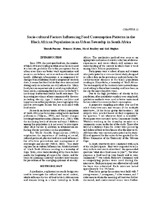Socio-cultural factors influencing food consumption patterns in the black African population in an urban township in South Africa

View/
Date
2006Author
Puoane, Thandi
Matwa, Princess
Hughes, Gail
Bradley, Hazel A.
Metadata
Show full item recordAbstract
The present study was undertaken to examine socio-cultural factors that influence food intake in different groups of people
residing in a black township in Cape Town. Focus group discussions and in-depth interviews were used to explore these factors in men, and
women of different age groups. Discussions were recorded, transcribed and analysed according to emerging themes. The main findings of the
study indicated that in addition to nourishing the body, food is a sign of warmth, acceptance and friendship. Meat consumption on a daily basis
is associated with a high socioeconomic status, while consumption of vegetables only is associated with a low socioeconomic status. Eating
large portions of food is associated with affordability. Food is used for celebrations, rituals, and for welcoming guests. Food is also used
during social occasions when people get together and meet socially. Sweets, ice cream and cakes are consumed on happy occasions. Fatty
meat is a sign of generosity; lean meat and black tea is often used during mourning periods. Eating behaviours are learned during socialization,
and carried over from generation to generation. There are socially accepted norms and values surrounding people’s understanding of what
food is. This information needs to be used in a more constructive way to help people choose food wisely to prevent over nutrition and
associated risks. In conclusion, this paper illustrates the impact of socio-cultural factors on eating patterns in this population and emphasizes
the need to take these factors into consideration in development of interventions to promote healthy eating.
